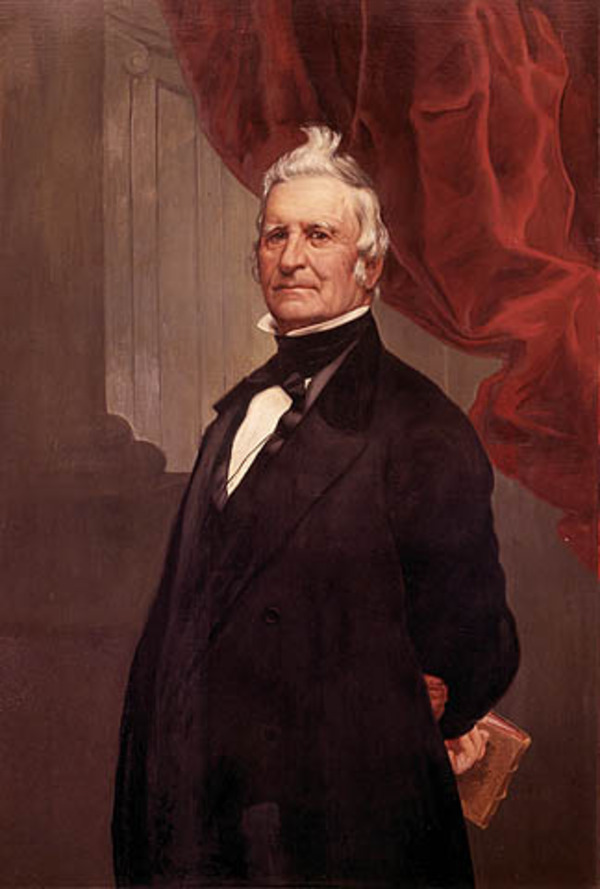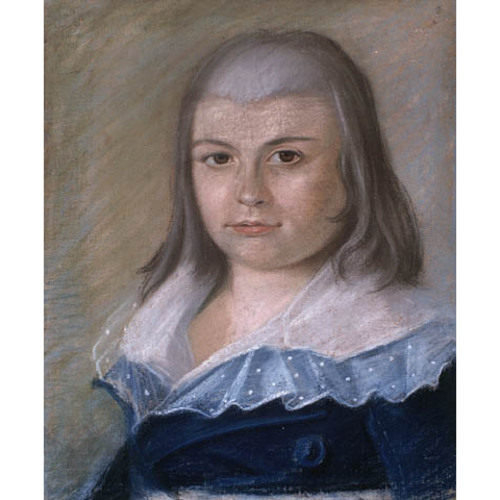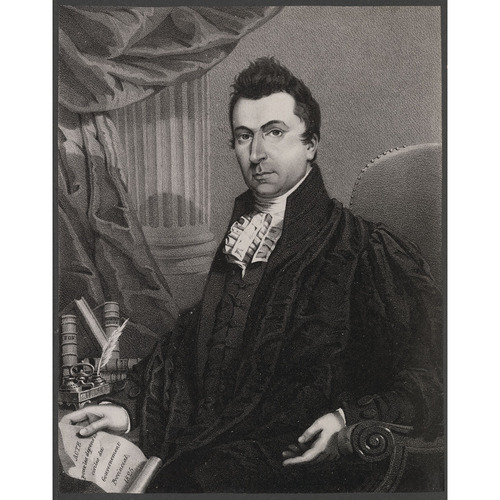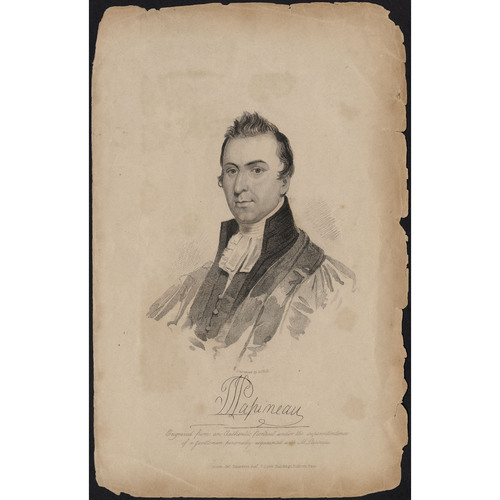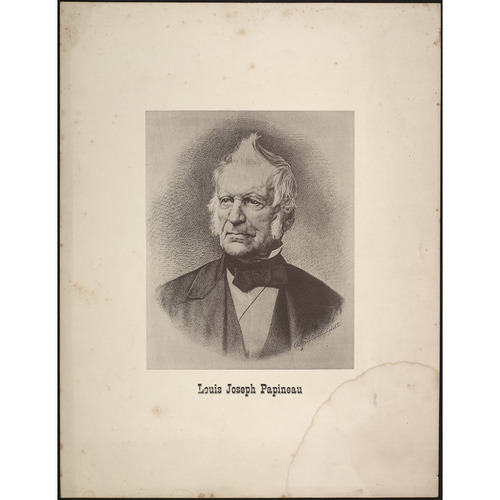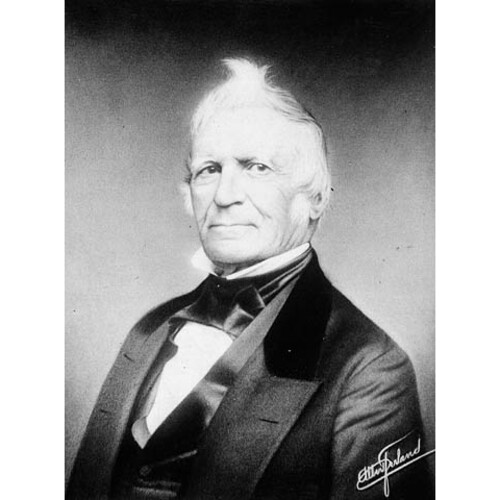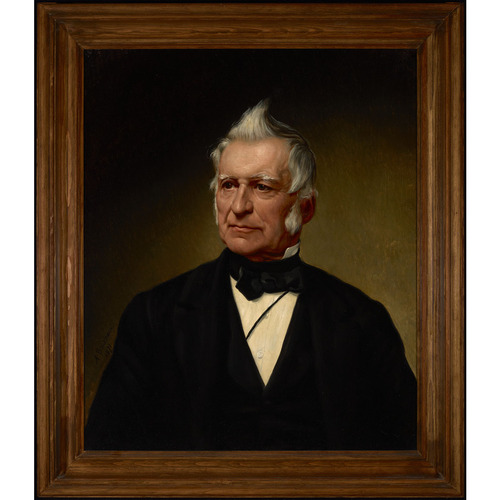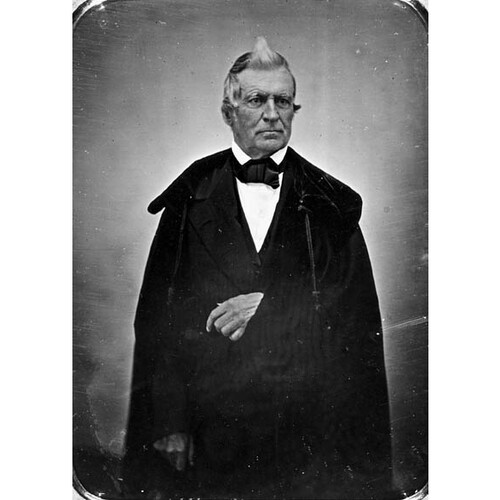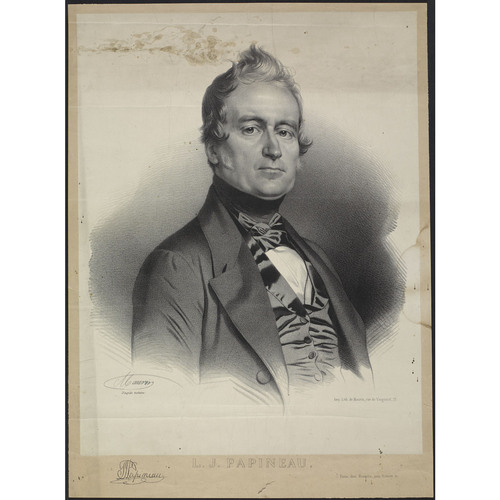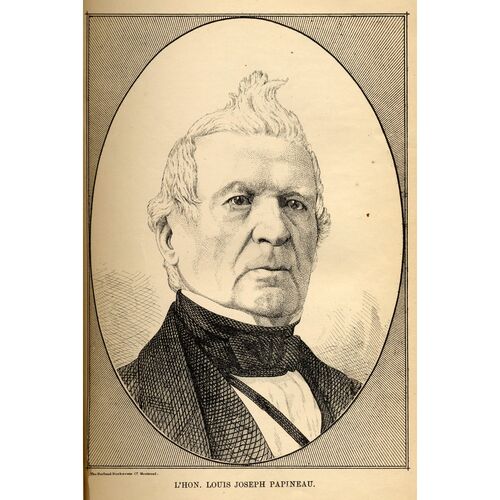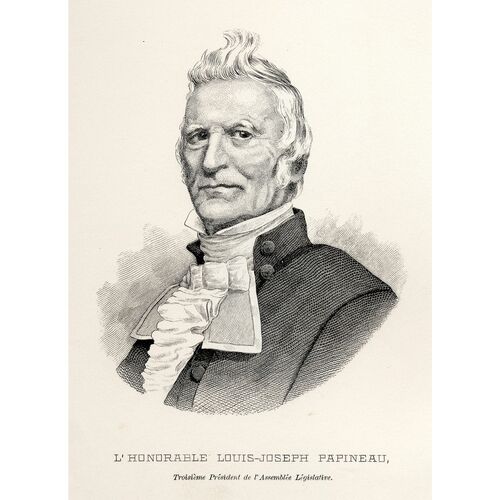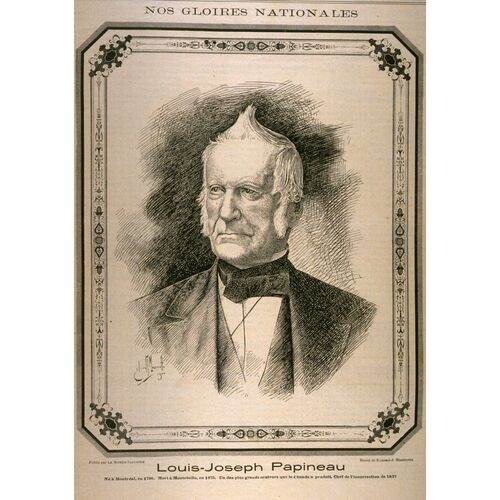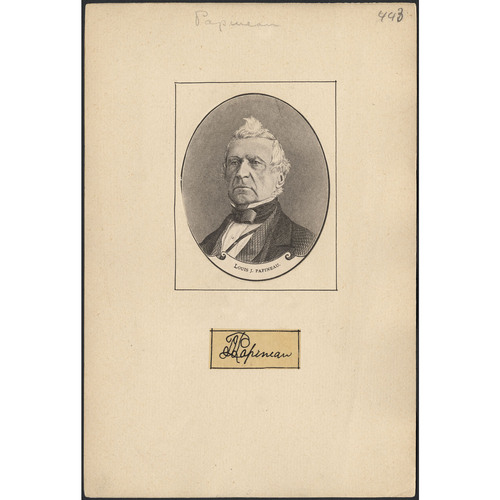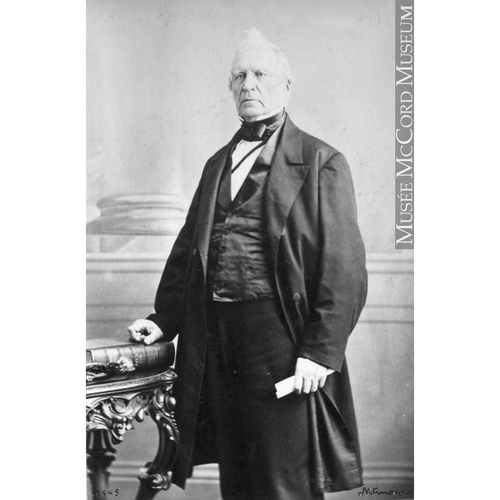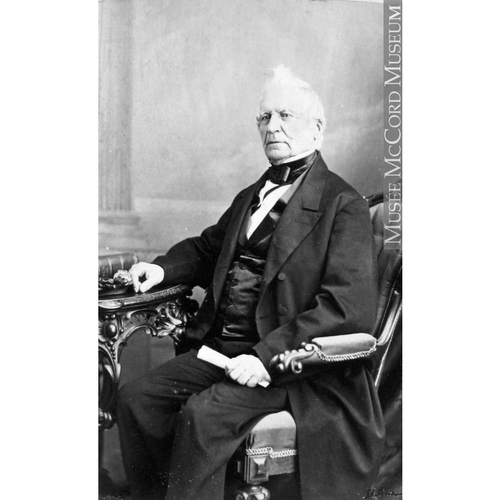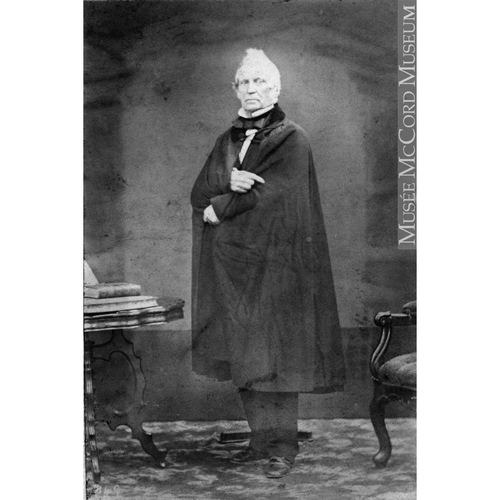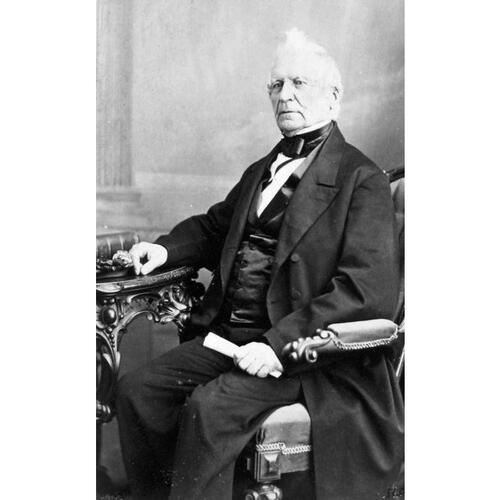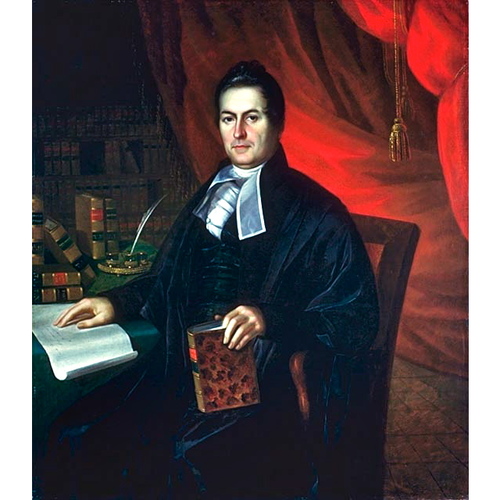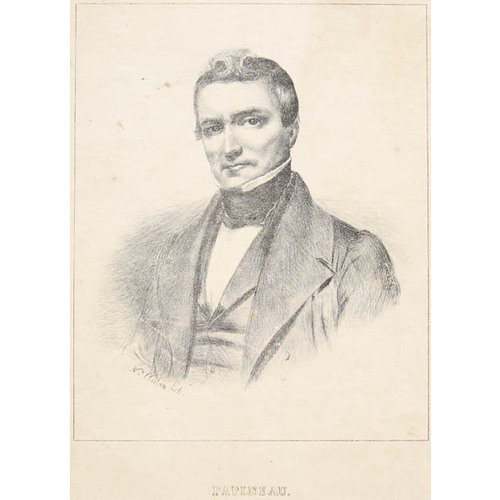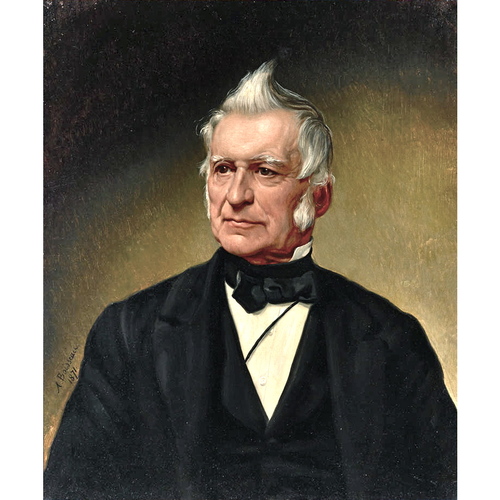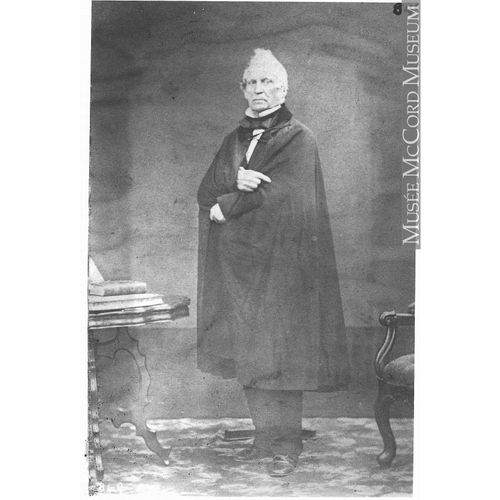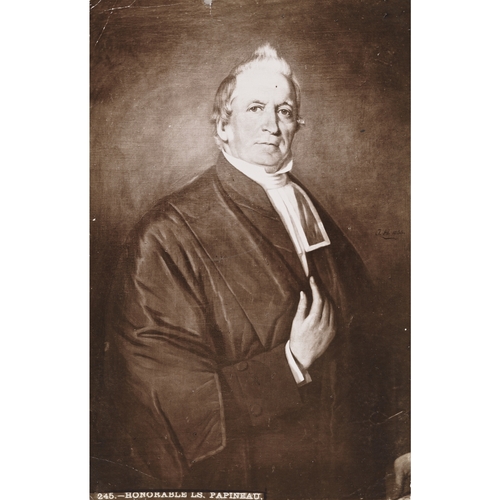PAPINEAU, LOUIS-JOSEPH, lawyer, seigneur, politician; b. 7 Oct. 1786 at Montreal, son of Joseph Papineau* and Rosalie Cherrier; d. 23 Sept. 1871 at Montebello, Que., and was buried there in the family mausoleum five days later.
The Papineau family had begun to emerge from obscurity with Louis-Joseph’s father, Joseph Papineau, a surveyor and notary, who on occasion constructed mills and managed seigneuries. He was a politician who himself became a seigneur by purchasing from the seminary of Quebec part of the seigneury of Petite-Nation on 19 June 1801 and the remaining section on 15 March 1803. This acquisition, which was to prove profitable, improved the social status of the Papineau family and coincided with the rise of the liberal professions in French Canadian society. It is therefore not surprising, in view of the central role played by the Papineau, Viger, Dessaulles, Cherrier, Bruneau, and other allied families in the society and politics of Lower Canada, that Louis-Hippolyte La Fontaine* should have denounced the political ascendancy of this family clan during the 1840s. Whether or not these family groups tended to form a “family compact,” they none the less influenced the political destiny of Lower Canada and Quebec throughout the 19th century. The family was, after all, perhaps the most powerful institution in French Canadian society. Louis-Joseph Papineau was born at a time when the values attached to the monarchy and nobility still exercised a potent attraction, and when the acquisition of a seigneury remained a mark of social advancement. The transition from the position of his grandfather, Joseph Papineau, a farmer and cooper, to his own status as a dignified seigneur could not be achieved without a painful psychological adjustment.
A gradual penetration of bourgeois values into the society had its effect on Papineau. Towards the end of the 18th century certain groups, chiefly connected with trade, began to define political and social power in terms of economic criteria. Their attitude towards wealth – the authentic source of prestige and power in their eyes – differed fundamentally from that of the traditional élites, but as years went by it was to acquire an even greater vigour and appeal. It was also in this period that the inferiority of French Canadians in the commercial and industrial sectors really became apparent; the British had become the main holders of wealth and were responsible for the spread of bourgeois values. Papineau’s formative years were thus lived amid a changing mentality. His contradictory attitudes, a blend of open hostility and fascination, towards the search for profit that characterized the businessmen and the British, certainly date from this time. “They alone,” he wrote about the British, “have the breeding, the fortune necessary for entertaining. No Canadian family can do it. . . . The resources of the country are devoured by the newcomers. And although I have had the pleasure of meeting among them educated and estimable men, who are glad to see me, the thought that my compatriots are unjustly excluded from sharing in the same advantages saddens me when I am at their gatherings . . . .” His ambiguous attitudes with regard to capitalist and seigneurial ownership, individual and collective rights, also illustrate his profound ambivalence towards what the bourgeoisie represented. The son of the notary Joseph Papineau did not join the ranks of the bourgeoisie immediately.
In fact the young Louis-Joseph Papineau was subjected to social pressures of another order. In many respects his family differed little from most peasant families, where the importance of the clan predominates. The family not only provided values and attitudes, it was also a source of prestige. The bonds of affection between its members did not, however, prevent rivalries from abounding. Papineau was to be profoundly marked by this family climate, which he never questioned, at least consciously. In this domain he showed uncompromising loyalty to tradition. For him the family environment was one of affection and security, a refuge if need be from a hostile society. It did not stifle the individual or render him unproductive.
Among the strong influences on Papineau, those of his father and mother were particularly significant. In the few letters the latter has left, she appears strong-willed, cold, at least outwardly, authoritarian, and unswervingly devout. No doubt she loved her children, but her affection bore an austere mask. It was obvious that Papineau would react against the conception of life and religion exemplified by his mother. His subsequent break with Catholicism and his search for a more optimistic vision of the world would indicate as much. Nevertheless, he never succeeded, despite his efforts, in liberating himself from this basic pessimism, which was perhaps innate but which was fortified by his education. He remained all his life an austere man who never attained the moderation and smiling scepticism taught by certain writers whose works he read. His choice of a wife who projected an image rather like his mother’s may be considered significant.
His father, a meticulous man, inclined to be gruff and uncommunicative, seems to have shown more benevolence and indulgence in his dealings with his children, particularly with Louis-Joseph, who was also his mother’s favourite, according to John Charles Dent*. It is certain that Joseph Papineau did not possess great religious fervour. He renounced Catholicism, probably during the 1810s, and did not return to it until shortly before his death. It should be noted that in addition to having been among the minority who favoured establishing parliamentary institutions, he had proved to be one of the most influential members of the House of Assembly. His efforts to adapt to new institutions and his activity as a member of the house certainly influenced the subsequent choices made by his son. Joseph Papineau was not a radical: he was a monarchist who professed a very moderate liberalism.
Once his primary education was completed, Louis-Joseph Papineau entered the college of Saint-Raphaël in Montreal, which was directed by the Sulpicians. In 1802, following an incident that brought him into conflict with the authorities, his parents sent him to continue his studies at the Petit Séminaire of Quebec. This institution did not aim, any more than the previous one, at forming revolutionary minds, or even minds merely inclined to innovation. The teaching programme could not have been more traditional. The supremacy of Latin was maintained, and the teaching, by its content, was directed towards the rejection of the heritage of the 18th century. Fear of the French Revolution and of its ideas animated the teachers. The cult of authority and obedience sustained an aristocratic and hierarchical vision of society. In a period when parliamentary institutions were opening the way for changes in political behaviour, these clerical establishments imposed on their pupils the theory of the divine right of absolute monarchy. Despite their leniency towards him, it is unlikely that his masters allowed Papineau to make the works of Voltaire, or the Encyclopédie of Diderot and d’Alembert, habitual reading. These books were probably in his father’s library. At the seminary, Papineau had the reputation of being a gifted pupil, not much of a worker but a great reader. He was even active within the Congregation de la Bienheureuse-Vierge-Marie-Immaculée. He was to state at the end of his life that he lost his faith at the seminary of Quebec. But in 1833 he praised his father “for the courage he showed in keeping me despite myself at the seminary”; and in 1804 he wrote to his young brother, Denis-Benjamin*, whom he urged to study: “Never have I felt more than I do now what I owe to the seminary.” It does not seem that his stay at the seminary of Quebec was marked by open revolt and brutal ruptures. The truth is less obvious and more complex: neither on the religious plane nor elsewhere do his choices appear to have been clear and final.
When he left the seminary in 1804, Papineau hesitated long as to what career to choose; in that respect he was like many graduates of the time, who were ill prepared by the environment and by their education to adapt themselves to social change. In fact the choices were few: once a student had rejected the priesthood, only the liberal professions were open to him. But would Papineau’s instability have allowed him to find full satisfaction in a profession even in a more diversified society? He first decided to become a notary, then, modifying his choice, he opted for the profession of lawyer. He received his legal training at Montreal, in the office of his cousin, Denis-Benjamin Viger*, complaining as he did so that he no longer had the time to read. Once authorized to practise law in 1810, he carried on his profession intermittently, and continued to make his dissatisfaction heard. In 1816 he wrote to his brother: “In truth, I am very much a slave at this moment, and that does not endear me over much to a condition with which I was disgusted, but what is to be done?” It was in this period that he began to celebrate the nameless hopes and joys of rustic life. In 1808 he had been elected to the assembly for the county of Kent, thus starting a long political career that was not to come to an end until after 1850: he represented the counties of Montreal West (1814–38), Surrey (1827–28), Montreal (1834–35), Saint-Maurice (1848–51), and Deux-Montagnes (1852–54). No doubt politics allowed him to express certain aspects of his personality, but they left him unsatisfied, eager for the day when he could live in the country with his family and books around him. Yet when he was confined to activities which up to then had been more a means of escape than of personal development, the exalted seigneur of Montebello was not to find peace, any more than the disappointed lawyer and the flattered political leader. The sources of his fear were within him: Papineau was and remained an eternal discontent.
Papineau entered the assembly at the height of a political crisis, which had begun in 1805. This crisis, which was unquestionably new, had been marked by the emergence of French Canadian nationalism and political parties. The economic, demographic, and social changes of the first decade of the 19th century were felt as a mortal threat by the elements which were becoming conscious of the existence of a “Canadian nation.” The liberal professions, in association with the small merchants, devoted themselves at that time to the defence of the traditional French Canadian institutions and opposed the English merchants, the public servants, the American immigrants, and the so-called “French Canadian traitors.” The former, however, went beyond the stage of passive resistance, and, through the intermediary of a political party whose main base was at Quebec, they shaped a strategy and theories which were eventually to give them power and control of patronage. The idea of ministerial responsibility supported this intention, to which the clergy and the old seigneurial families took exception. During the 1810 crisis, a rift was opened between the clerics and the new political élites.
Although his father had warned him against the “so-called reformers” and the “demagogues,” and had suggested that he vote on questions according to their merit, Papineau joined the Parti Canadien. The settling of the political crisis in 1810 precipitated the end of the leadership of Pierre-Stanislas Bédard*, and was the beginning of a period during which various claimants disputed for the right to lead this party. Bédard’s protracted rancour against the Papineaus suggests that at bottom the latter had little interest in a comeback of the former leader. The conciliatory policy of the governor, Sir George Prevost*, would serve young Louis-Joseph Papineau’s ambitions. Its aim was to silence the extremist elements or remove them from the direction of the party. François Blanchet*, Gabriel-Elzéar Taschereau*, Andrew Stuart*, Louis Bourdages*, and Jean-Baptiste-Amable Durocher did not succeed in commanding attention at a time when Papineau appeared as a moderate. James Stuart*, the most serious candidate, came into direct collision with the governors, and, as Bédard said, could not claim to be a “true blue Canadien,” although he was a friend of the “Canadiens.” In 1815 Papineau was elected speaker of the House of Assembly, which gave him a salary of £1,000 a year. He was already appearing as the real successor to Bédard.
On 29 April 1818 Papineau married in the parish of Notre-Dame de Québec Julie Bruneau, daughter of Pierre Bruneau*, a Quebec merchant and an mha. In the preceding year he had bought the seigneury of Petite-Nation from his father. Despite the rivalries of all kinds which plagued the Parti Canadien, his authority continued to grow with the ever increasing concentration of problems in the Montreal region. The crisis of 1822 over union was to add to his prestige and authority. The merchants’ party, previously in a minority in the house, had submitted to the London parliament a bill aimed at bringing about a political union of the St Lawrence valley, an essential condition for the launching of a programme of economic development and the assimilation of the French Canadians. There was violent opposition in Lower Canada; Papineau and John Neilson* went to London in 1823 to prevent the adoption of such a measure. The groups opposed to the plan of union may have had varying motives, but Papineau and Neilson none the less appeared as the representatives of an extraordinarily large majority of the population. Their mission had relatively little effect on the course of events in England, where the government, in the face of the energetic opposition of certain members of the House of Commons, deemed it wise not to reintroduce the bill, but they nevertheless had the credit for the decision. Papineau, moreover, was able to exploit for political ends the fear generated by this plot, attributed to business circles. On his return he had no difficulty in resuming his position as speaker of the assembly, which Joseph-Rémi Vallières* de Saint-Réal had occupied during his absence.
In 1826 the Parti Canadien became the Patriote party. Not only did it reinforce its regional and local bases, while remaining first a Montreal party in which the Papineaus, Vigers, and Cherriers enjoyed great influence, but it also acquired an organ, the newspaper La Minerve, to be directed by Ludger Duvernay*. Papineau’s authority, despite the rivalries that continued in the party, increased as the party’s objectives became more extreme. The party brought together “the most diverse elements: the French Canadian middle bourgeoisie, a few English liberals, the Irish, farmers of American origin who had settled in the [Eastern] townships, and the French Canadian peasant classes.” Defections were severely punished, and rivals ruthlessly thrust aside. In this connection, Thomas Frederick Elliot wrote in 1835: “I have never seen anyone who appeared more skilled than this Canadian speaker in the contrivances and comportment by means of which a single man dominates the minds of a large number, and he becomes more rooted every day in his authority, as they in their obedience. Such is the man whom a small number of his supporters have the presumption to believe that they can discard when he is no longer useful to them. . . . One look from Papineau would subdue all his Canadian flock.” Papineau had thus arrogated to himself the authority he enjoyed, but the authority itself rested on a consensus much less conscious than the one of which the Patriote Abbé Étienne Chartier* spoke in a letter written to Papineau in 1839: “Your misfortune, sir, is to have been spoiled as a result of the extraordinary influence and fame which the Canadiens have deliberately conferred on you, by all flocking round you, and by raising you upon their shoulders, in order that by this fictitious grandeur you might tower above all the Tory luminaries.”
The practice, after 1830, of systematic obstruction, which was intended to force the English government to adopt the reforms sought, was imposed by Papineau. But within the Patriote party a wing of authentic liberals was talking about revolutionary action, and placing more and more emphasis on social transformation. La Fontaine, one of Papineau’s lieutenants and already one of those aspiring to succeed him, had clearly felt the ambiguities in the ideology of the party and of its leader. In February 1837 he wrote to Henry Samuel Chapman: “People have reconquered their natural independence by having recourse to arms, and by letting the earth drink the blood of their oppressors. . . . To stir up peoples, one must not rest content with debating purely abstract questions. Something more solid is required. One must touch the sentimental part: the purse. So long as a question of this nature is not raised, agitation cannot be constant and lasting. In the circumstances, I see no question more calculated to lead to this end than the abolition of seigneurial rights. Apart from the seigneurs and the government, everyone desires it, whatever their shade of political opinion. I am therefore firmly resolved to bring this proposal up for discussion at the opening of our next session. . . . The government, the seigneurs and the hauts petits aristocrates of both parties will no doubt oppose it; but the masses will unite and act in concert.” Basically, the problem raised by La Fontaine revealed a conflict, still latent, between the dominant element, represented by Papineau, which wished to change the political system without interfering with the social structure, and an active but minority group seeking to bring about a political and social revolution. The Papineau group was firmly opposed to any institutional change, whether it concerned the seigneurial system, or the customary law of Paris, or even the status of the clergy. Thus, when the prospectus for the newspaper Le Patriote canadien, of which Duvernay was publisher, appeared, Papineau wrote to his wife on 29 April 1839: “So long as there is not national representation, which can remedy abuses in provincial, civil or ecclesiastical institutions, we are giving arguments to the government abroad so that it can abruptly destroy structures which, contained within proper bounds, will protect Canadien interests, and which, if overthrown by the fanaticism of Protestants or philosophers, will be so for the benefit not of the people but of those in power.” The opposition between the two groups of Patriotes was due not only to differing views of strategies, but also to differing ideologies.
The thinking of a man so unstable as Papineau, and a politician into the bargain, is not easy to describe. If he tended to act as though moved by the most absolute disinterestedness, the purest patriotism, and rigid obedience to sacred principles, he was none the less inclined to present the image of the great democratic liberal battling against obscurantism, corruption, and the oppression exercised by reactionary colonizers greedy for wealth. It was for this cause that he would have willingly agreed to sacrifice his tranquillity and his happiness. This view of him – his own – which was accepted by many people at the time and subsequently, belongs more to myth than to reality. In Papineau, the nationalist, when he was not using new ideologies to support conservative objectives, was usually at war with the liberal and the democrat.
Papineau had taken up French Canadian nationalism as he had found it at the time of Bédard. This nationalism was at first pledged to the defence of linguistic rights and traditional institutions, which were in no way liberal and democratic – quite the contrary. In this connection Papineau, when weighing up the principal achievements of the House of Assembly, wrote: “The ecclesiastical institutions of the country would have been reduced to nothing, the notariat debased, not a single Canadien would be at the bar, and landed property would have been taxed to fatten a crowd of tax-collecting Europeans, if the administration had not been checked by the resistance of an elective Assembly.” This judgement revealed more than a state of fact; it expressed a permanent element of Papineau’s politics and thought.
Papineau had read the philosophes of the 18th century and the liberal thinkers of his day, and he declared himself a supporter of their doctrines. By his declamations against medieval feudalism, against nobles and aristocrats of all times, even on occasion against the descendants of the old French Canadian seigneurial families, Papineau might appear a bitter adversary of the old regime. His eulogies of the authors of the American Declaration of Independence and of the Declaration of the Rights of Man in France implied that he was in favour of a conception of property as individual and absolute and opposed to the feudal conception. In reality he remained throughout his life a supporter of the seigneurial regime. He would never admit openly that France had introduced feudal servitudes as well as seigneurial servitudes into Canada, and that the regime served as a support for a hierarchical and aristocratic society. This attitude might be explained by the fact that he was a seigneur himself. But Papineau saw in seigneurial tenure not only a traditional but also a national institution. Indeed in 1855 he wrote to Eugène Guillemot, the former French minister to Brazil: “My father had bought the seigneury he sold to me, being prompted and impelled by the desire to save the remains of our Canadien nationality from being stifled by the English government. Systematically the latter denied land to the Canadiens and lavished it upon the men of their own race, but placing it under the operation of English laws, pettifoggers’ traps that would have swallowed up our compatriots who were unfamiliar with them.” A year earlier he had attacked the Rouges: “The Rouges are hastening their bondage by their anticlericalism and their antiseigneurial attitude, for the clergy and the seigneurs are the country’s safeguard.” According to him the role of the seigneurial system had been to procure land free for the French Canadians and to protect them against the British, particularly against the merchants, who considered land to be property of the capitalist type. Seen in this light the seigneurial system was supposed to act as a brake on the mobility of landed property and on speculation. Instead of concentrating property in a few hands, this system, according to Papineau, tended to divide up the land equally between individuals. The seigneur was not therefore a large landowner to whom a mass of censitaires were subject, but the unremunerated architect of equality. If the enormous abuses committed by the seigneurs of Lower Canada were pointed out to him, Papineau replied that the system had deviated from its intentions, and that all that was necessary was to restore its original purity by legislative and judicial means.
After 1830 Papineau became a democrat. Influenced by Thomas Jefferson and by Jacksonian democracy, he considered North America the natural site for the development of a republic of small landowners. “Canada,” he declared in 1833 in one of his speeches, “a country which is impoverished by the harshness of its climate, and in which laws and customs have always favoured the equal division of property, rejects substitutions, condemns the privileges of primogeniture, and should be the last place where such an inept measure should be attempted.” Seeking to reconcile his democratic ideas and his attachment to the seigneurial system, Papineau tried to show that the Canadian temperament, the seigneurial system, and democratic ideology all pointed towards the same goal: equality of conditions. This rationalization concerning the seigneurial system and its social intentions was a pure creation of the mind, which was accepted by numerous supporters of the Patriote party. But the liberal wing of the party could not but come into conflict with Papineau on this point. The break occurred after the failure of the first insurrection in 1837. Robert Nelson wrote at that time: “Papineau has abandoned us, and has done so for personal and family motives related to the seigneuries and his inveterate love for old French laws.” This uncompromising attachment for the seigneurial regime shows that Papineau was not prepared to consider a recasting of civil law. Despite the admiration that he professed for the Code Napoléon, it is clear that he could not accept the conception of property that had served as a basis for this legal revolution. Papineau recognized it himself: he was a liberal and democrat in politics but a conservative in regard to the “sacred right” of property. No better definition of economic and social conservatism can be found. By refusing to interfere with the seigneurial system, he sanctioned the status and economic privileges of the clergy.
Papineau’s thought hardly obeys any formal logic. It fluctuates in accordance with his likings and aversions, conscious or unconscious, with his ambitions, his own interests and those of the people he represented. Canon Lionel Groulx* even speaks of a “nebulous incoherence of thought” that increased with age. All this tallies indifferently with the claims of Papineau, who posed as a rationalist philosopher and never missed an opportunity to point out the strictness and firmness of his principles. This rigid but poorly connected thought, which might be considered the product of conscious opportunism, reflects the complex personality of the man. His religious ideas in particular reveal his profound uncertainty. Gradually, after leaving the seminary of Quebec, Papineau drew away from Catholicism. While still believing in God, he finally rejected all revealed religions. It is obvious, although this is not the chief explanation for his religious evolution, that the influence of the 18th century philosophes and of the La Mennais of Paroles d’un croyant was of capital importance. He found in their works, as well as a stimulus to his anticlericalism, the kind of arguments that would confirm his religious, political, and moral attitude. Violently anticlerical, he showed himself to be also a sharp critic of religious education, the privileges of the church, and the union of church and state. Thus, in the 1831 session, Papineau strongly supported the “notables bill” introduced by Louis Bourdages, which proposed to allow almost all the inhabitants of a parish to share in the administration of the parish council. He denounced the attitude of the members of the clergy who “claimed that they constituted within the state, in civil society, among citizens who were all subject to the laws, a privileged, independent order . . . , and that they could dictate how a part of the fruits of the labour of citizens should be employed.” Around 1836, he proposed to place university teaching within the responsibility of “national representation” (i.e., the state): “put under civil, lay control, with full and complete tolerance for all, this establishment [the university] will produce incalculable benefits; under the direction of ecclesiastics of one persuasion or another, such an establishment could riot and will not be so liberal.” When he returned from exile, he was to declare himself still more an enemy of nobles, priests, and kings, who were naturally in league against liberty and tolerance in all its forms. The Canadian clergy’s attitude towards the Parti Canadien and the Patriote movement, as well as their close association with the state, no doubt helped to increase Papineau’s anticlericalism. His religious experience was however accompanied by an authentic questioning of part of the Catholic heritage which had been handed down to every French Canadian of the period. To a certain extent, Papineau, as a political leader, attempted to adjust social institutions to his political and religious beliefs. He certainly envisaged society as a lay society, with churches separate from the state. He put forward and supported several measures with this design in mind. But in this domain he appears to have been surprisingly timid for an avowed liberal. In reality Papineau feared that by modifying the status of the Catholic Church he would play into the hands of the real or supposed enemies of the French Canadian nation.
Papineau saw in Catholicism a national institution, possessing, therefore, the same protective virtues as seigneurial tenure. If he saw the latter as French Canada’s buckler against Anglo-Saxon capitalism, the Catholic Church appeared to him as the safeguard of this same nation against the Church of England – “the ally of the persecution that had been contrived against Canadiens” – and against a “Protestant” government. Thus, in 1826, when Papineau, in the debate on the bill that proposed to grant Protestant dissenters the right to keep registers of births, marriages, and deaths, took up the cudgel for the Presbyterians, Methodists, and Jews in the name of religious liberty, it was clear that his first object was to undermine the claims of the Church of England. In that connection, he wrote to his wife: “The fact is that there was an offensive and defensive alliance between Mr. Mountain [Jacob Mountain*, the Anglican bishop of Quebec], and Mr. Sewell [Jonathan Sewell*, the attorney general of Lower Canada], directed against the political and religious rights of Catholic Canadians and of all Protestants other than those who wanted to follow Mr. Mountain.” A true liberal, in these matters, would rather have spoken of the responsibilities of the state than utilized arguments drawn from liberalism to defend and extend the privileges of the churches. The truth is that Papineau always closely associated Catholicism and the French Canadian nationality: “I admit, however,” he wrote about his cousin in 1821, “that as a neighbour I should have little liking for Bishop [Jean-Jacques Lartigue*], for fear he . . . should take it into his head to preach at me. But as for the progress of the establishment of the Canadien clergy, since their interests are bound up with all other Canadien interests, I would resign myself to this inconvenience, as well as to all the others that I would not like to put up with as a private person but that I accept as a public figure.”
Papineau was hurt by the incomprehension of the Catholic clergy, who saw in him only a liberal and a democrat dangerous for the church, and he reproached them for equating “sovereignty of the people” with the overthrow of Catholicism, for confusing popular sovereignty and national sovereignty without realizing that their real influence must be based upon the support of the French Canadian nation. In a letter to his wife, dated 9 Nov. 1835, he said: “They [the priests] are either knavish or irresponsible when they fail to see that there is one maxim the English government will never give up, namely the need to de-nationalize us in order to anglicize us, and that to accomplish this end they attack our church with no less ardour than they do our laws, customs, and language.” His obsession with England so obscured Papineau’s thinking that he postponed until later, perhaps to the day of independence, the pursuit of his liberal objectives in politico-religious matters. Meanwhile the clergy, under the aegis of Bishop Lartigue, were adjusting their ideology to the new age, without liberalizing it, and undertaking a struggle that in a few decades was to ensure them social supremacy. Papineau did not understand these innovations. Even after his return from exile in 1845, he continued to make similar declarations which, it must be said, were not inspired only by the desire to take back power from La Fontaine. Thus, in 1848, he declared in a public speech: “Our clergy come from the people, live in and for the people, are everything for the people, nothing without the people. Here is an indissoluble alliance. Here is a unity that is strength. . . . Here is a pledge of indissolubility for a nationality. . . . As a politician, I repeat that the agreement and affection between our clergy and our people has been and always will be one of the most powerful elements in the preservation of our nationality.” These words throw light on the social conservatism of Papineau, which was incompatible with his religious liberalism. It is here that the contradictions of the man really appear: a deist, he remained nevertheless a prisoner of the social institution, the Catholic Church.
To this social conservatism, of which the seigneur of Montebello, attending church to set a good example to his censitaires, was the symbol, was added an economic conservatism. Certainly Papineau had felt the influence of the French physiocrats, who, opposed though they were to the feudal system, had exalted the prime importance of agriculture in the French economy; but that is not enough to explain his particular emphasis. His economic conceptions were clearly dominated by the idea that the vast majority of French Canadians lived on the land and took a very small part in important commercial activities. For him, agriculture was the predominant economic activity, and any economic policy must proceed from that fact. In a word, the vital objective of French Canadians must be to acquire the land, making use of the framework most suited to its equal distribution and to a humane society: the seigneurial regime. His social ideal was the small farmer, virtuous and, perhaps, enlightened.
Papineau’s hostility to commerce was no doubt rooted in tradition, but it also resulted from the fact that large-scale trading was controlled by the British, who were promoters of capitalism in all its forms. He believed that they were endeavouring to build an economy and a society in which the mass of the French Canadian proletariat, both urban and rural, would be dominated by a minority of men of large property of British origin. It was against this eventuality that he fought. It would be pointless to see in him a socialist. When he criticized English tenure and English common law, it was these tendencies that he was condemning. When he objected to the establishment of government registry offices, it was always through fear of the same dangers. Papineau came to the point where he pictured the English business bourgeoisie as an aristocracy of wealth, and therefore an artificial one, which was aspiring to reinstitute in Canada a society founded on inequality. “It seems to me,” he said during the debate on the Ninety-two Resolutions in 1834, “that there is nothing baser than the English nobility who come to us in this country, so eager are they to place themselves and to enrich themselves.” As his democratic ideas became more deeply rooted, Papineau, the seigneur, saw the merchant classes more and more as the product of an aristocratic plot fomented by England herself. Thus, in objecting to the timber trade, to massive investments in transportation, which was undergoing a total upheaval, and to banks, he had the feeling that he was working against those responsible for the economic bondage of the French Canadians, and he believed also that he was doing away with a developing aristocracy. After recommending to the population that they withdraw their money from the banks, he declared in December 1834, before the electors of Montreal West: “They will call that destroying trade, whereas in reality it will merely be escaping from enemy hands to fall into friendly ones. Producers will continue their habits of work and economy, the only important sources of a country’s wealth. Whether there are banks or not, there will not be one acre more farmed, or one acre less. From the moment that there is a surplus of exchangeable produce, the European capitalists, in view of the profit they would derive from it, will have it bought up.” This attitude towards banking institutions recalls that of the Jacksonian democrats. In reality the resemblances are only superficial.
This stand is surprising in a man who professed to be the disciple of Adam Smith and Jean-Baptiste Say. In practice, Papineau had retained from his reading of the two economists only their philosophy of free trade. By taking fragments of their thought, he was able, in addition to acquiring allies in England, to combat the protective tariffs on Canadian timber and grain. He needed an effective weapon against the business world, where his chief political opponents were. Finally, even his belief in free trade reveals the ultra-conservatism of his economic thought.
Papineau’s nationalism was therefore strongly rooted in his economic and social conservatism. Even on the religious plane, his aims and liberal aspirations were compromised by this dominant attachment to tradition. Seen in this perspective, his political liberalism and his adherence to democratic ideology raise similar questions, for it seems difficult to reconcile fundamental conservatism and doctrinaire liberalism. When we try to determine the roles that these two facets of his thought were called upon to play, the contradiction can be partly resolved. It is clear that in accepting French Canadian nationalism, such as it was at the time of Bédard, Papineau was at the same time endorsing the political strategy which, in order the better to protect the traditional institutional and cultural heritage, aimed at the assumption of power by a “truly national élite.” Even if Papineau tended to present himself as the “national leader” and the authorized spokesman of the French Canadian nation’s aspirations and interests, he none the less remained the real representative of a more restricted section of society. His strong ties with the liberal professions, which were aspiring to power and the benefits of patronage, are in this respect most significant. His presentation of himself as a man of principle above factions, as a pure symbol of a will towards national regeneration that was beyond all the pettiness of daily action, came both from his personality and from the image of himself that he wished to project. Papineau, despite a gift for oratory which would have enabled him to put himself on the people’s level, was not by inclination a popular speaker. The great majority of his speeches were intended for a more educated group. His political friends even reproached him with not maintaining steady contact with the populace. Thus, when he spoke of the “people” and the “nation,” he referred more to a minority that knew the real needs of the worthy masses. His liberalism was therefore in the last analysis bourgeois or even aristocratic. In this sense he belonged to his century.
When Papineau entered politics in 1808, he shared the unbounded admiration of the Lower Canadian élites for British institutions. Montesquieu, Voltaire, and several other 18th century philosophes had already extolled the merits of the English constitution. The English were, moreover, the first to see in their political institutions a matchless achievement. Papineau wrote: “My education is more English than French. Indeed it is in the English publicists and in the writings of public men that I have studied the English constitution.” He took part in the war of 1812 as a militia captain, for at that period Papineau refused to accept republicanism and democracy after the French or American manner. He remained an ardent monarchist, although he had broken with the absolutist tradition. His attitudes towards the “aristocratic branch” may not be clear; on the other hand his belief in the primacy of the “popular branch” grew stronger over the years. From the beginning of his political involvement, his place was among the Reformers. Certainly one can see here the influence of John Locke in particular, but there were other and more varied influences working upon him. Basically, he looked to the constitutionalists and to active politicians, both in the colonies and in England, for the justification of political choice that he had already made. It is in his nationalism that one must seek the principal source of his reform attitudes. During the debate on the Ninety-two Resolutions in 1834, Papineau analysed the political evolution of the colony before the Quebec Act, and noted: “At that period, there were men who claimed their rights as men and as British subjects. It was recognized that there were principles conforming to the law of nations that could not be violated; that there was a population possessing laws, a religion, a language, customs, and institutions that must be preserved.” His main interpretation of the granting of parliamentary institutions can be placed in exactly the same perspective: the English government, he declared in 1833, “had just published some sound maxims. They should have added practice to theory, and have given us a political structure by means of which we could have repulsed the assaults attempted against our institutions.” According to him, the constitution of 1791 was supposed to give Canadiens a political instrument destined to ensure the survival of their culture and institutions. On the other hand, according to him, the working of these institutions after 1792 had attributed a kind of supremacy to the governors, the officials of British origin, and the English merchants, who had formed an alliance with the two French Canadian groups least conscious of national objectives: the clergy and the old seigneurial families. In his opinion, the political structures had been manipulated by elements that were hostile to or little aware of the real interests of the French Canadian nation. As to the actual representatives of the nation sitting in the assembly, their influence was almost nil. It was because of this subjective way of looking at the balance of political forces that Papineau accepted the idea of the responsibility of the executive. The aim of those who subscribed to this thesis was to get the real power into the hands of those whom he was to call later “the national representation.” After his rise to the leadership of the Parti Canadien in 1815, Papineau, always with this perspective in mind, brought the struggle to bear on the control of public funds. While attacking the French Canadian nation’s enemies on all possible fronts, he made the voting of supplies the priority question in his political strategy. Behind the discussions of principles and constitutional theories, Papineau, whose interests were linked to those of the liberal professions, led the fight for the conquest of political power. His movement, which was based on liberal ideas, was in essence primarily nationalist. It was this surface liberalism that won him the cooperation of the English radicals.
Until around 1830, Papineau remained convinced the British institutions constituted a perfect framework for the survival and development of the French Canadian nationality. It was sufficient to model the local constitution on that of England, and allow it to evolve according to the same principles. Moreover, the fact of belonging to the empire was a guarantee against the United States, and in general against American influence. In his mind, the good faith of Britain could not be called in question. The opponents of the French Canadians, he thought, resided in Lower Canada. They were at times the governors, ill counselled by their entourage, but particularly the highly placed officials and the merchants. For him, certain groups within the French Canadian nation, such as clerics and nobles, represented a danger, for they did not understand their true interests. There were also those who, for personal motives, rallied to the side in power. If he thundered against all these types of people, he never questioned the validity of the bonds that united Lower Canada to the mother country. Already in 1823, however, on his trip to England, he was struck by the aristocratic character of English society and the poverty of the urban masses, and began to ask himself questions. In Lower Canada too, economic and social uneasiness was spreading discontent in the rural milieux. The overcrowding in the liberal professions, and the instability of the lower bourgeoisie in country districts and towns, also suggested the need for more radical political action. The influence of the Paris revolution of 1830 was another invitation to take a more extreme stand. Increasing social tensions were having a hardening effect in all sections of society. Papineau let himself be carried along by this prevailing mood, which worked in his favour. It must be said that the growth of his ambitions coincided with his successes. Despite the concessions made by England, the beginning of the 1830s saw the stepping-up of demands. Papineau’s thought tended to turn in another direction.
From that time on Papineau believed in the existence of a plot between the mother country herself and the internal enemies of the French Canadians, the object being the complete subjection of the latter by the implantation of an aristocratic society in Lower Canada. In December 1834 he declared in Montreal West: “No nation ever knew how to govern another. The affection of the Bretons [affections bretonnes] for Ireland and the colonies has never been anything more than the love of pillaging Ireland and the colonies, which had been abandoned to exploitation by the Breton aristocracy and its creatures.” This criticism of the aristocratic character of the British constitution, directed particularly against the Legislative Council, on which sat representatives of the business world, became more and more extensive as the struggle for power became more bitter. In March 1836, after William Lyon Mackenzie*, the leader of the Upper Canada Reformers, and Marshall Spring Bidwell, the speaker of the House of Assembly of Upper Canada, had sent Papineau extracts of the instructions given to the commissioners made responsible for inquiring into the situation in Lower Canada, he violently attacked the English colonial system: “It is only to place in the colonies junior men whom they do not know what to do with in the mother country, it is only to ensure for itself a European influence, that the old colonial regime is preserved. . . . In the Canadas, as in all the other colonies of England . . . there cannot be elements from which to make up an aristocracy or seeds out of which to raise one.” Quite obviously, Papineau was seeking to prove that the colonial system was an instrument by which British institutions could be used to ensure economic, political, and social control for an aristocratic minority imported from Great Britain. His rejection of English institutions was only partial, and to the extent that they served his political objectives he was loyal to them. “There will be found,” he wrote, “in the English publicists, in parliamentary histories, in the speeches of [Charles] Fox and others, sublime maxims concerning public law and liberty . . . the enemies of the Canadien name who want to give such narrow limits to English liberty would do much better to go and read them. . . . It is therefore essential for us to recognize in this source the institutions that suit us and that can never be taken from us. From the time that we have belonged to England, we have had the right to institutions as democratic as hers. An attempt has been made to give us an aristocracy, and the system has proved not to be applicable.”
Papineau’s past distrust of the United States now gave place to unstinted admiration for American institutions. In 1832 Papineau declared himself a republican. The influence of Jacksonian democracy on him is not in doubt; that of Jean-Jacques Rousseau and later of Charles-Alexis-Henri Clérel de Tocqueville is also present. American democracy was, according to him, the reflection of a sort of state of nature peculiar to America. After the American revolution, “pure republicanism” supposedly had flourished in New England, and subsequently spread to all the new states. “But what has been the progress of the United States?” declared Papineau in 1834 during the debate on the Ninety-two Resolutions. “As new agreements have been formulated everything has tended towards democracy. It is therefore in the nature of things that under a government where the influence of birth has been destroyed, where the influence of fortunes is weak . . . it is natural . . . that there should be no privileged classes. . . . If therefore all the changes in this part of the world have been conducive to the establishment of the democratic system, and if those states which have been the last to be established in the west are the most democratic of all, it is evident that this is an order of things special to America, and that one cannot create an aristocracy there.”
At bottom Papineau, while retaining from the English constitution what served his political strategy, was to draw from the American model a theoretical justification for the radical transformation of the Legislative Council. The latter would need to be elective because of the fundamentally democratic character of the society of Lower Canada: “The ministers have tried to bring the aristocratic principle into full operation in the Canadas, whose social constitution is essentially democratic, where every one is born, lives and dies a democrat; because every one is an owner; because every one has a small piece of property; because we come into the world, live, and will die in a country that is side by side with the United States.” By means of ministerial responsibility, the Patriote party and Papineau would have made sure of the control of the executive and the public service; through an elected Legislative Council and the extension of the elective principle to lower levels, the party would have dominated the second legislative branch and the other sources of power. In the light of this naturally democratic society, where the seigneurial regime, the customary law of Paris, and the privileges of the church would still exist, one can understand that Papineau’s opponents should question his real objectives. They would certainly not feel that their economic interests and those of the country would be in good hands if Papineau gained his ends.
The idea of instituting by peaceful means a Lower Canadian republic, of which he would naturally be the president, took shape after 1830. By the practice of obstruction, and in particular by the systematic refusal to vote supplies, Papineau proposed to force the British government to bring about radical changes. Nevertheless, in 1834, as is shown by his speech to the electors of Montreal West, which was published in December in La Minerve, he would presumably have been satisfied with a statute allowing a large measure of autonomy, within the empire, for Lower Canada: “A local, responsible, and national government for each part of the Empire, as regards settlement of its local interests, with supervisory authority held by the imperial government, to decide on peace and war and commercial relations with foreign countries: that is what Ireland and British America ask for; and that is what within a very few years they will be strong enough to take, if there is not enough justice to give it to them.” The Ninety-two Resolutions introduced in the House of Assembly on 17 Feb. 1834 made clear Papineau’s aspirations and political ideas. These resolutions, prepared by a small committee composed of Papineau, Elzéar Bédard*, Augustin-Norbert Morin*, and Louis Bourdages, contained a summary of the principal grievances of the house and of its most important requests: control of revenue by the legislature, responsibility of the executive, and the election of legislative councillors. In the following year, when a certain number of Patriotes contemplated without apprehension the possibility of a violent confrontation, Papineau wrote: “We will not withdraw the requests we have made for the full measure of our political powers and rights. . . . We hope, but with some unease, that the British government will give us justice. In this hope we will do nothing to hasten our separation from the mother country except to prepare the people and make them ready for an age that will be neither monarchical nor aristocratic.” This weakening of the belief in normal political strategies on the part of the Montreal Patriotes continued until 1837, when London, by adopting the resolutions of Lord Russell, categorically rejected the Patriotes’ requests, which it deemed excessive. This formal refusal precipitated a confrontation that rapidly took on the character of a revolutionary movement.
Papineau’s behaviour during the 1837 insurrection is not very easy to explain. His conduct appeared more ambiguous than ever, and he also took care to destroy the documents that he knew to be compromising. He warned his subordinates to do likewise. After the event, he maintained the following argument: the Patriotes did not intend to revolt; the government, in order to crush them the more effectively, had forced them to defend themselves; and he himself had advised against any recourse to arms. He also declared that he had had no connection with the Banque du Peuple, thereby admitting the justice of the accusations made against that institution. He said that it was only on his way through Saint-Charles that he had gone to the assembly there, and that he had left Saint-Denis at the beginning of the fight only at the express request of Wolfred Nelson*. According to his interpretation, he was supposed to keep himself in a safe place in order to be able to act as a negotiator in case of a defeat. It is obvious that, taken as a whole, this explanation does not stand up against a serious examination of the facts.
During the months of April and May 1837 the Patriotes put their strategy into shape. Unanimity does not seem to have prevailed among them. The radical wing, dominated by people such as Nelson, Cyrille-Hector-Octave Côté*, Édouard-Étienne Rodier*, Amury Girod*, and Thomas Storrow Brown*, certainly opted for openly revolutionary steps. On his side, Papineau represented the more prudent and moderate elements, and appears to have favoured more complicated tactics: that while opinion was being prepared for an armed struggle, action should in the first stage be kept within the bounds of “constitutionality.” He thought that by stirring up the population and boycotting taxed products, the English government would finally be forced to give way. Under Papineau’s direction, the Comité Central et Permanent du district de Montréal, reorganized on 15 May 1837, was to coordinate the action of the Patriotes throughout the entire province. If, however, these methods proved ineffective, he would then agree to the use of force. In this contingency, armed revolt was not to take place until December, after the freeze-up. On 10 May 1837 Papineau drew up two wills. In 1839, Abbé Chartier wrote: “It is unfortunate that Lord Gosford [Acheson*] did not put off his attack until after 4 December, the day for which all the leaders received notice to be at Saint-Charles, and when you would have had to sign a declaration of independence: you would not have to defend yourself today against the charge of not wanting a revolution because no contradictory document exists.” Abbé Chartier added that he had himself destroyed a note sent by Papineau to the Patriote Jean-Joseph Girouard*. As well as having been widely known among Lower Canadian Patriotes since at least June 1837, this plan had also been communicated to the revolutionaries of Upper Canada.
Similarly, the relationships between the Banque du Peuple, or certain elements of it, and the revolutionary movement are still less clearly established, but they seem more and more plausible. In November 1839 Abbé Chartier wrote: “As for money, was not the Banque du Peuple, which had been in existence barely a year, universally understood to have been established for the purpose of the revolution, and in order to help it? Is it not this motive, which the shareholders skilfully made known, that underlay the rapid success which came to this most patriotic establishment? The cowardly directors of this bank, they too, will have a terrible reckoning to face on the day when payments are due, and they do not seem even to suspect it.” Several of the directors and shareholders, the majority friends and relatives of Papineau, were involved in one way or another in the revolutionary events. Before leaving Montreal, Papineau was in continuous contact with his cousin Louis-Michel Viger*, the president of the bank. Questioned in 1840 by Abbé Chartier on his relations with this institution, Papineau replied “that he had always been opposed to setting up the Banque du Peuple, and that he had predicted to Louis-Michel Viger that it would be the tomb of his popularity and even of his patriotism.” In short, he did not deny the connections between the bank and the movement. Abbé Chartier ended with the words: “I was very glad to learn that he had nothing to do with this bank, which has so much disappointed the hopes of Canadians.” It should also be noted that, during the insurrections, the rumour circulated that if the Patriotes triumphed this institution would become the “national” bank, and the other banks would be eliminated. Likewise, the sudden arrival of Édouard-Raymond Fabre*, one of the directors of the bank, at Saint-Denis, just before the battle, his conversation with Papineau, and his no less sudden departure, raise a number of questions. Charles Dansereau declared in 1840: “To the best of my knowledge, no one came to tell P. [Papineau] and O’Callaghan [Edmund Bailey O’Callaghan] to slip away, and to say that it was Dr. [Wolfred] Nelson’s orders. If there had been someone to send Papineau and O’Callaghan away, it could only be Mr Fabre . . .” Truth to tell, all of this can only serve to supply material for a hypothesis which, if verified, would allow us to uncover certain minority but powerful interests that influenced the course of the revolutionary events, and most probably the supreme commander.
Once the series of great assemblies in the six counties got under way, Papineau quickly lost control of a number of the revolutionary leaders, who openly preached revolt and sought to direct the movement towards a revolution of a social character, which no doubt the directors of the Banque du Peuple and Papineau scarcely desired. For his part, Papineau, even if he recommended sticking to legal means, encouraged initiatives of a revolutionary character by what he said. This was how the Association des Fils de la Liberté came into being: divided into two sections, civil and military, it “reproduced the double intention of the plan of resistance” advocated by Papineau. This surge of agitation reached its highest point at the time of the great assembly at Saint-Charles, which on 23 Oct. 1837 issued a declaration of the rights of man. Papineau went to Saint-Charles accompanied by an armed escort. A few days earlier Papineau’s wife had told her son Lactance, a student at Saint-Hyacinthe, that his father might visit him after the assembly. This assembly truly marked a turning-point. For the radical elements it constituted a virtual declaration of independence and the beginning of a trial of strength between them and the government. As for Papineau, he still urged the use of peaceful means. Forgetting the revolutionary nature of several resolutions passed on that occasion, he later reproached the radicals for having prompted the government, by their behaviour, to intervene before the moment appointed for the uprising.
After the Saint-Charles assembly, Papineau’s behaviour appears more and more ambivalent. Indubitably he was afraid. In particular the way the liberals acted frightened him, but at the same time served his ends. His interviews with Denis-Benjamin Viger, before his forced departure from Montreal, are significant of the conflicts within the man himself. The government’s decision to arrest the leaders and intervene militarily forced him to go to the Richelieu valley. Once he got to Saint-Denis, he acted both as supreme commander, distributing generalships, and as the leader of the civil section. It was probably at the time when these civil and military sections were set up that arrangements were made, perhaps at the direct or indirect suggestion of Papineau himself, to provide cover, in the event of an emergency of a military nature, for the two promoters of the civil section: Papineau and O’Callaghan. Seen from this angle, the visit, after the arrest of Louis-Michel Viger, of Édouard-Raymond Fabre, who no doubt had important news to transmit, may merely have hastened the departure of the two men. Once in the United States, Papineau travelled under an assumed name. Meanwhile he had forgotten his role as a negotiator.
The months that followed marked the break between Papineau and the extreme radical elements of the movement [see Nelson]. The Patriote leader had met influential Americans, who were ready to back a retaliatory expedition. This plan was not adopted at the assembly of refugees held at Middlebury, Vermont, because Papineau refused to accept a declaration of independence involving the abolition of seigneurial rights, customary law, and tithes. His intransigence, more than differences over strategy, explains the profound disagreement that gradually divided the refugees. It is possible that the religious question also counted for something in this conflict. Dr Thomas Fortier, of Gentilly, wrote to Duvernay in 1840: “I am neither a Jesuit nor a bigot; but when one wants to revolutionize an ignorant people, one must be acquainted with its spirit and not offend its prejudices, but rather utilize them as a stimulus – your railing against the clergy and the tithes has spread terror among this body, they have taken alarm; they have had the idea that you would follow the course of the French revolutionaries, that you would despoil them; [Robert] Nelson’s proclamation did not reassure them.” It is obvious that Papineau was linked with those Patriote elements, clerical or anticlerical, that closely associated religion and nationality. The attitude of Jean-Philippe Boucher-Belleville, who stated around 1840 that anticlericalism was no longer justifiable, since all the parish priests had become nationalists, is significant. That Papineau should have supported the endeavours of Abbé Chartier, who was seeking to modify the anticlerical fever among the refugees, is also revealing. Thus the gap widened more and more between the two groups. Papineau consequently kept aloof from any invasion plan, at the same time as he tried to obtain the support of the French, Russian, and American governments. The insurrection of 1838 took place without his participation. He was opposed to the venture, yet he did not protest when the leaders of the second rebellion used his name as a rallying cry to stir the population to revolt. His brother-in-law, Théophile Bruneau, wrote to Duvernay on 11 Oct. 1838: “I warned Papineau that I had taken the oath of allegiance to Nelson’s provisional government, and that I was a member of the secret societies of Albany. . . . I told him further that we were going to use his name freely everywhere, except in the matter of money. . . . So use his name with discretion in New York, I am certain we shall not be disavowed by him.”
From the spring of 1838 on, the refugees’ hostility towards Papineau increased. Not only did they reproach him with having abandoned the cause, but they attributed to him more and more responsibility for the failure of 1837. Several went so far as to talk about his flight from Saint-Denis. Côté spoke of exposing him publicly. But several refugees tried to stop an action that would harm the movement, because of Papineau’s extraordinary popularity among the people. In October 1839 Dr Antoine-Pierre-Louis Consigny wrote to Duvernay: “No one blames Papineau more strongly or detests him more heartily than I do; but for the sake of the cause, I believe it is better to keep silent than to try to lay low the arrant poltroon who is the principal source of all the evils that have weighed so heavily on the country since 1837.” After the failure of the second insurrection, the refugees, convinced that Papineau’s presence in the United States was a basic obstacle to any revolutionary plan, worked out a plot to get him away to France. Papineau was to win French sympathy for the Lower Canadian cause. On 8 Feb. 1839 he sailed from New York for Paris.
His stay in France, where his wife and three of his children went to join him, produced no political result. Until 1845, Papineau lived there poor and most often alone, but following Canadian events with great interest. He sometimes worked at the Bibliothèque Nationale or the archives, where he copied and had copied documents relating to the French period. He had contacts with liberals, socialists, and even Irish nationalists, and visited Italy and Switzerland. It was not until 1845, two years after his wife’s return to Canada, and because of her insistence, that he finally decided to end his exile; he had obtained a full amnesty a year earlier. It was also because of pressure exerted by his wife, and by a certain number of his friends, that he turned towards politics again in 1848. For some time, once he had been elected mla for the county of Saint-Maurice, he maintained friendly relations with the La Fontaine group. But soon the inevitable divergences came to the surface. Papineau did not readily tolerate being one man in a crowd, and his political beliefs appeared irreconcilable with those of his chief La Fontaine.
To begin with, Papineau refused to accept the union of the Canadas, which he regarded as a disgrace. For him the future, since the defeat of 1837, lay rather in the direction of annexation to the American republic. Though his nationalism remained as uncompromising as before, he proclaimed more loudly than ever the strength of his democratic beliefs. It is true that the notion of annexation to the United States occasionally led him to question himself as to the repercussions that this fusion into the great American universe might have on French Canadians. In this connection, he had written to his wife in May 1838: “But Canadiens are so much an unusual people on this continent, that it is painful to think of the necessity of a dispersal in which they would not recover the combination of circumstances that has given them their moral and religious habits, their language, their laws, and a nature as happy, gay and sociable as theirs is. There is no Englishman who does not derive the greatest advantage from settling in any part of independent America, or who has not the most legitimate reasons for doing so. For such people emigration leaves no true cause for regrets.” But these momentary misgivings rapidly disappeared before the unbounded admiration that he had for American institutions, and before his hatred of “aristocratic England.” Socially and even culturally, Lower Canada, once it had become an American state, would have in his estimation every chance of flourishing in this prophetic environment. Since Papineau could not approve of the abolition of the seigneurial system, which the supporters of La Fontaine demanded, his conflict with the latter gave rise to violent attacks on both sides. As for a number of Papineau’s former collaborators, among them Wolfred Nelson and Duvernay, they now considered the future of Lower Canada to lie within the empire. What was more important, they commanded the support of public opinion, both from the élites and from the masses. Ministerial responsibility seemed to them the best solution to the French Canadian problem as a whole. Beaten, Papineau still supported the annexationist movement of 1849, but gradually withdrew from politics. From 1852 to 1854 he was an mla for the county of Deux-Montagnes, but he did not stand in the election of 1854. During the last part of his life, he devoted his time to his seigneury at Montebello.
After his return from France, Papineau had renewed contact with his seigneury. The prospects of development had become good because of the growing number of censitaires and the possibilities in the area for lumbering. From then on Papineau took an active interest in his fief. Certainly he was not the seigneur that he dreamed of being: the protector of the good, happy peasant and the guardian of equality. He looked after his interests with care, prosecuted recalcitrant censitaires, and utilized for his own benefit the rich resources offered by the forests that covered a great part of Montebello’s 178,000 acres. As one might expect, he objected with the utmost vigour to the movement in favour of the abolition of the seigneurial system. Just before 1854, disregarding his past prejudices because he was afraid to lose part of his possessions, he even went so far as to ask that his fief be converted into free and common socage.
Papineau had always wished to live in the country, with his wife and surrounded by his books. By his marriage with Julie Bruneau he had had three boys and two girls, but only the two latter remained by his side. Ezilda and Azélie, who was to marry Napoléon Bourassa*, had like their mother no wish to live on the seigneury. In order to attract them, and perhaps imbued with the desire to project a magnificent image of himself, Papineau built a luxurious manor-house. Yet he did not succeed in conquering their repugnance. This last period of his life was marked by frustrations and domestic misfortunes.
Politically he changed little. He continued to denounce responsible government as a hoax, and the advent of confederation as one more attempt to perpetuate English monarchical and aristocratic institutions in Canada. The movement that produced the Institut Canadien, of which he was an honorary member, seemed to him more promising, but it did not satisfy him fully. He expressed his disagreement with the antiseigneurialism and anticlericalism of this movement, which in reality was only a small minority group, no doubt a very active and noisy one, but one that was incapable of making common cause with the great mass of people that bowed to the conservatism of the liberal professions and to an ultramontane clergy. From 1850 until his death in 1871, Papineau, without succeeding in solving his contradictions, remained the prophet of annexation and democracy. To the great indignation of the priest of the parish, the seigneur of Montebello refused to return to the faith of his youth and died loyal to his deist convictions.
[An exhaustive bibliography of materials on Papineau would have to mention most of the large series of documents covering at least 1810–50. Only the most essential items are listed here. The best source is doubtless the ANQ. The Collection Papineau, which in 1961 was one of the richest private collections in Canada, provides the basis for any study of Papineau. His letters to his wife for the period 1820–62 have been published in APQ Rapport, 1953–55, 187–442; 1955–57, 255–375. Julie Papineau’s correspondence from 1823 to 1862 has also been published in APQ Rapport, 1957–59, 55–184. At the ANQ there is as well: QBC, Procureur général, Événements de 1837–1838; the papers of Ludger Duvernay; and a copy of the correspondence of Charles-Ovide Perrault in the Édouard-Raymond Fabre papers. The National Library (Ottawa) and the PAC also have some Papineau papers, mostly correspondence.
Other archival collections are also important. At the ASQ, the Verreau collection includes the Viger papers which give much interesting information in the series of manuscript volumes by Jacques Viger* entitled “Ma Saberdache.” At the PAC, the following papers are useful: MG 24, B1 (Neilson collection); B6 (Denis-Benjamin Viger papers). The large series of official correspondence and correspondence of the bishops also provide information, and to trace the career of a man in public life special attention must be given to the numerous newspapers of the period.
Papineau’s “Histoire de l’insurrection du Canada,” published in Paris in May 1839 in the Revue du Progrès, is also an important historical document. f.o.]
Several biographies of Papineau have been published. Eve Circé-Côté, Papineau, son influence sur la pensée canadienne; essai de psychologie historique (Montréal, 1924). L.-O. David, Les deux Papineau (Montréal, 1896). L’honorable Ls.-Jos. Papineau (Montréal, 1872). Alfred Duclos de Celles, Papineau, 1786–1871 (Montréal, [1905]). Robert Rumilly, Papineau (Montréal, [1944]). Benjamin Sulte, “Papineau et son temps,” Mélanges historiques, Gérard Malchelosse, édit. (21 v., Montréal, 1918–34), XIII.
For complementary information the following should be consulted: Papineau; textes choisis, Fernand Ouellet, édit. (Cahiers de l’institut d’histoire, 1, Québec, 1964). Gérard Filteau, Histoire des Patriotes (3v., Montréal, 1938–39). Lionel Groulx, Notre maître le passé (3 sér., Montréal, 1924–46), 1 (3e éd.), 189–213; 2 (2e éd.), 69–133; 3, 245–54. A. R. M. Lower, Colony to nation; a history of Canada (1st ed., Toronto, 1946). Edgar McInnis, Canada, a political and social history (new ed., New York, 1961). Monet, Last cannon shot. Fernand Ouellet, Histoire économique; Louis-Joseph Papineau, a divided soul (Canadian Hist. Assoc. Historical booklets, 11, Ottawa, 1961). Marcel Trudel, L’influence de Voltaire au Canada (2v., Montréal, 1945). Mason Wade, Les Canadiens français de 1760 à nos jours (L’Encylopédie du Canada français, III, 2e éd., 2v., Ottawa, 1966), I. Fernand Ouellet, “Les insurrections de 1837–1838: un phénomène social,” SH, no.2 (November 1968), 54–82; “Papineau dans la révolution de 1837–1838,” CHA, Report, 1957–58, 13–34; “Papineau et la rivalité Québec-Montréal (1820–1840),” RHAF, XIII (1959–60), 311–27.
Revisions based on:
Bibliothèque et Arch. Nationales du Québec, Centre d’arch. de Gatineau, ZQ2-S1, 28 sept. 1871. Bibliothèque et Arch. Nationales du Québec, Centre d’arch. de Montréal, CE601-S51, 7 oct. 1786. Bibliothèque et Arch. Nationales du Québec, Centre d’arch. de Québec, CE301-S1, 29 avril 1818. La Minerve (Montréal), 4, 8 déc. 1834. Claude Baribeau, La seigneurie de la Petite-Nation, 1801–1854: le rôle économique et social du seigneur (Hull [Gatineau, Québec], 1983), 24–25. Joseph Desjardins, Guide parlementaire historique de la province de Québec, 1792 à 1902 (Québec, 1902).
Cite This Article
Fernand Ouellet, “PAPINEAU, LOUIS-JOSEPH,” in Dictionary of Canadian Biography, vol. 10, University of Toronto/Université Laval, 2003–, accessed April 28, 2025, https://www.biographi.ca/en/bio/papineau_louis_joseph_10E.html.
The citation above shows the format for footnotes and endnotes according to the Chicago manual of style (16th edition). Information to be used in other citation formats:
| Permalink: | https://www.biographi.ca/en/bio/papineau_louis_joseph_10E.html |
| Author of Article: | Fernand Ouellet |
| Title of Article: | PAPINEAU, LOUIS-JOSEPH |
| Publication Name: | Dictionary of Canadian Biography, vol. 10 |
| Publisher: | University of Toronto/Université Laval |
| Year of publication: | 1972 |
| Year of revision: | 2017 |
| Access Date: | April 28, 2025 |


